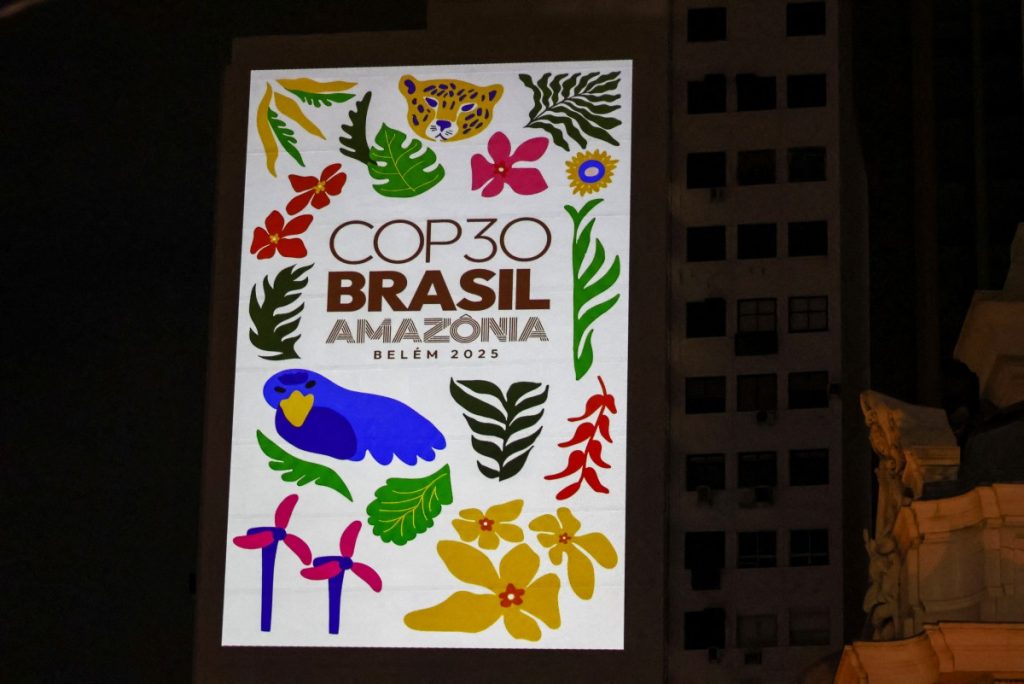Listen to the article
Environmental activists in Brazil’s Rio de Janeiro staged a powerful visual demonstration yesterday, projecting images related to the upcoming COP30 UN climate conference onto a building adjacent to the historic Municipal Theater.
The nighttime display, captured by photographer Douglas Shineidr, featured stark visual representations calling for immediate action against climate change. The projections illuminated the building’s facade with climate-related imagery, creating a striking contrast against the city’s nighttime skyline.
This public demonstration comes as Brazil prepares to host the COP30 conference, a critical gathering of world leaders and environmental experts scheduled for late 2025. The symbolic location near Rio’s Municipal Theater—one of the city’s most recognizable cultural landmarks—was strategically chosen to maximize public visibility and impact.
The activists’ projection campaign represents growing impatience among environmental groups regarding the pace of climate action globally. Brazil, which contains approximately 60 percent of the Amazon rainforest, stands at a crucial intersection of climate policy and environmental preservation efforts.
Local environmental organizations have intensified their advocacy efforts in recent months, using increasingly creative methods to capture public attention. The projection technique—sometimes called “guerrilla projecting” or “light activism”—has become a popular tactic among climate activists worldwide for its visual impact and ability to transform public spaces into temporary platforms for environmental messaging.
Brazil’s role as COP30 host carries particular significance given the country’s complex relationship with environmental protection. The Amazon rainforest, often described as the “lungs of the Earth,” continues to face threats from deforestation, illegal mining, and agricultural expansion. Environmental groups have consistently pressured the Brazilian government to strengthen preservation policies and enforcement mechanisms.
The upcoming COP30 conference will mark a crucial milestone in international climate negotiations, arriving at a time when climate scientists warn that the window for meaningful action to limit global warming to 1.5 degrees Celsius is rapidly closing. Previous conferences have produced mixed results, with critics pointing to gaps between nations’ pledges and actual implementation of climate policies.
Rio de Janeiro’s selection as the host city also highlights the increasing vulnerability of urban coastal areas to climate change impacts. The city has experienced more frequent extreme weather events in recent years, including flooding and landslides, which experts link to changing climate patterns.
The visual protest comes amid growing global climate activism, with demonstrations increasing in frequency and scale worldwide. Climate action movements have evolved to include diverse tactics ranging from traditional marches to digital campaigns, artistic interventions, and direct action.
Brazilian climate activists face unique challenges, navigating complex political dynamics while advocating for stronger environmental protections. The country’s economic reliance on agricultural exports and natural resource extraction sometimes creates tension with conservation goals, though many business leaders have begun acknowledging the importance of sustainable practices.
Public opinion polls indicate rising concern about climate change among Brazilian citizens, particularly younger generations. This shift in perspective has been fueled partly by visible environmental changes, including more severe drought cycles affecting agricultural regions and water supplies in major cities.
As preparations for COP30 continue, Brazilian authorities have pledged to showcase the country’s environmental innovations alongside addressing persistent challenges. The conference is expected to focus on accelerating climate finance, enhancing national climate commitments, and addressing climate justice concerns.
International observers note that Brazil’s hosting of this major climate summit represents both an opportunity and responsibility to demonstrate leadership on environmental issues. The activist projection in Rio serves as a reminder of the public expectations for meaningful outcomes from the upcoming conference.
The visual demonstration in Rio is likely just the beginning of what promises to be an intensifying campaign of climate activism leading up to the crucial 2025 climate negotiations.
Fact Checker
Verify the accuracy of this article using The Disinformation Commission analysis and real-time sources.




8 Comments
This is a concerning development, but I’m glad to see the authorities taking it seriously. Disinformation can seriously undermine climate progress, so strong action is needed to combat these tactics.
Absolutely. Maintaining public trust and a shared understanding of the science will be crucial for achieving meaningful climate action at COP30.
The Amazon rainforest is such a vital carbon sink, so Brazil’s environmental preservation efforts will be closely watched leading up to COP30. Tackling disinformation will help ensure an honest, productive dialogue.
The projected visuals sound quite impactful. Raising awareness through bold public displays is an effective way to rally support for climate action, especially in the face of disinformation campaigns.
Interesting to see these disinformation campaigns targeting the upcoming COP30 summit. It’s crucial that world leaders and experts have a clear picture of the climate challenges we face without misinformation muddying the waters.
Kudos to the activists for using innovative visual tactics to raise awareness. Projecting climate imagery onto a landmark building is a creative way to cut through the noise of disinformation.
The activists’ projection campaign is a powerful visual statement calling for urgent climate action. Hosting COP30 puts Brazil at the center of these critical global discussions, so addressing disinformation will be key.
Agreed. Brazil’s role as host gives it an opportunity to demonstrate real climate leadership, but first it must contend with these misleading campaigns.